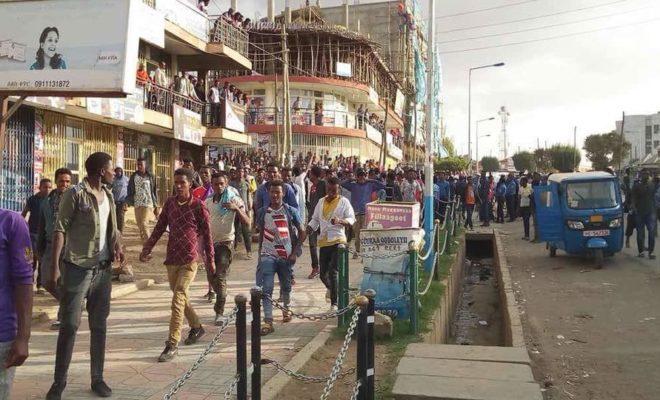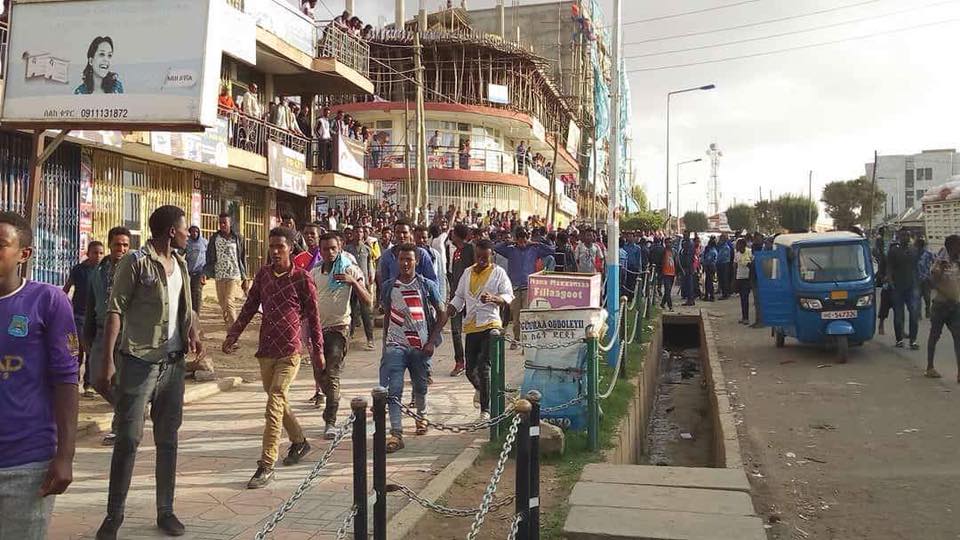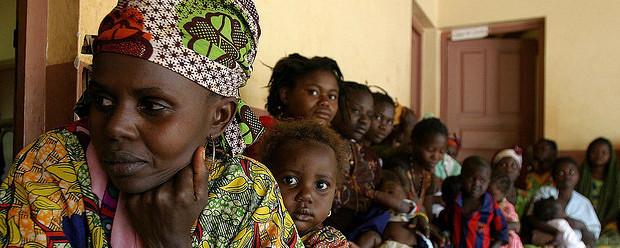Ethiopia’s next Prime Minister

As it picks Ethiopia’s next leader, the ruling coalition can pave the way for genuine reform or instil more discontent.

Oromo protesters marching last week calling for the release of opposition figures in Ethiopia. Credit: Jawar Mohammed.
The last week has been a highly dramatic and unpredictable one for Ethiopia. On 14 February, hundreds of political prisoners, journalists and opposition leaders were released from prison. A day later, Prime Minister Hailemariam Desalegn abruptly announced his resignation to pave the way for political reforms. And then, barely 24 hours after that, the Ethiopian government declared a six-month nationwide state of emergency.
This unprecedented pace of events – coming on the heels of long-running street protests – has left many people, including in Ethiopia, bewildered.
How did we get here?
This sequence of affairs comes as Ethiopia has been tottering from one crisis to another for some time.
Street protests by the country’s two largest ethnic groups – the Amhara and Oromo, who together make up over two-thirds of the 100 million-plus population – refuse to die down. The economy is in a downward spiral amid soaring inflation and a debilitating shortage of foreign currency. And the UN estimates that at least one million people were internally displaced in the border clashes between the Oromia and Ethiopian Somali states in 2017, leading to serious humanitarian concerns.
This myriad of crises prompted the top brass of the ruling Ethiopian People’s Revolutionary Democratic Front (EPRDF) to hold a high-stakes meeting in December. For 17 days, the “do-or-die” Executive Committee meeting deliberated at length in Addis Ababa. Amongst other things, the ruling coalition acknowledged that its problems were exacerbated by a lack of internal party democracy and by the weakness of its top leadership.
A few days after the talks, on 3 January, Prime Minister Hailemariam, whose fate was essentially sealed by then, announced the government would release political prisoners and close the infamous Maekelawi prison. This surprise move was billed as an effort to widen democratic space and build a national consensus.
Since then, more than 6,000 prisoners, including some on death row, have been freed. Tens of thousands remain behind bars, but the gesture was praised as an important step towards reconciliation and reform. Ethiopians responded by organising massive homecoming rallies. This celebratory atmosphere was further invigorated when Hailemariam announced he would be stepping down on 15 February.
Will the State of Emergency quell unrest?
However, this optimism was soon dampened the next day by the imposition of a state of emergency. The government last declared martial law in October 2016 at the height of the Oromo protests. It lasted ten months until August 2017, after which protests erupted once more.
This shows that the turmoil in Ethiopia requires political solutions, not the same old repressive measures that have brought the country to the brink of collapse. Fortunately, the EPRDF still has a chance to redeem itself and reverse the state of emergency. Parliament, which is completely controlled by the ruling coalition, is expected to return from recess in the coming days to ratify the emergency decree. They should overrule this authoritarian measure and instead mandate civilian leadership to seek democratic ways of dealing with the unrest.
As observers such as Awol Allo have pointed out, the current turmoil does not meet the threshold required for imposing a state of emergency. Besides, the sweeping decree, which would curb freedoms of expression and assembly amongst others, is unlikely to restore stability. Instead, it will engender more outrage and could lead to further security crackdowns and more avoidable deaths.
In fact, stay-at-home strikes and protests have continued in the last few days, while defiant rallies are still being held for released prisoners across Oromia and Amhara states.
Who will succeed Hailemariam?
With EPRDF leaders meeting this week to appoint Hailemariam’s successor, the question everyone is asking is who it will be.
Hailemariam, who hails from a small ethnic group in the South, was widely regarded as a figurehead and mere shadow of his larger-than-life predecessor Meles Zenawi. The deep state and powerful Tigrayan People’s Liberation Front (TPLF) party undercut him at every turn as corruption, factionalism and widespread upheaval ran the country into the ground. In addition to his sometimes laughable imitations of Meles, Hailemariam will simply be remembered for leaving Ethiopia in ruins, amid a state of emergency, and with an uncertain future.
In picking the next PM then, the EPRDF should send a clear signal to the Ethiopian people and jittery international partners by choosing a capable leader who can unite the country behind democratic reform.
It could also use the appointment to resolve the unacknowledged Oromo question, an age-old Oromo demand for a national political role commensurate with the community’s size and contribution. It is discontent at political marginalisation that fuels the Oromo protests.
Appointing Ethiopia’s first ever Oromo prime minister could appease protesters. However, this individual would also have to be an able leader with the temperament and political will to steer a deeply fractured nation out of the current chaos and into calmer waters. Such a leader would need popular legitimacy within the Oromo while still being able to gain broad-based support from other ethnic groups. He or she must be willing to sit down with the opposition and engage in good-faith negotiations on the country’s future.
An Oromo prime minister?
On this front, two names come to mind: Lemma Megersa, the president of Oromia state; and his deputy Dr Abiy Ahmed. Together, they have remade the Oromo Peoples’ Democratic Organisation (OPDO), one of the four ethnic-based parties that makeup the EPRDF coalition, into a driver of reform.
They did this by making the protesters demands their own. They vowed to reform the system, create jobs, and end corruption, promising to join the angry youth if their efforts were frustrated.
“Oromos will determine the fate and future of this country,” Lemma said in a speech last February. “Ethiopia cannot continue to exist as a country without Oromos’ full participation and without affording the Oromo people their fair share.”
Through this change of rhetoric and approach, this dynamic duo have transformed a one-time docile and despised organisation into the people’s party in the span of a year.
Between the two figures, Lemma would be the popular national choice to ascend to the top-post. His support base transcends ethnic and even political party lines. And he has made bold overtures to Ethiopia’s unity, describing Ethiopian-ess as “addictive”. However, he faces technical hurdles. The prime minister has to be a Member of Parliament and Lemma isn’t.
Who is Abiy Ahmed?
If the EPRDF does opt for an Oromo PM as many are expecting, this paves the way for the equally charismatic 41-year-old Abiy. This would be disappointing to the many Ethiopians openly rooting for the well-liked Lemma. But there are practical advantages to Abiy’s rise. For instance, stability in Oromia will be key to the success of the next PM, and Lemma may be better qualified to reform the Oromia bureaucracy than Abiy. He can unite the Oromo behind his call for “economic revolution” and contain street protests.
There would be several causes for optimism if Abiy were appointed. He comes from a mixed religious background with a Christian mother and Muslim father, and he is fluent Amharic, Oromo and Tigrinya. He is an excellent communicator who, according to party insiders, prefers evidence-based decision making and has a PhD from Addis Ababa University. Meanwhile, his rise through the army to the rank of Lieutenant Colonel has given him an understanding of the inner-workings of the military-intelligence complex, an important asset if he is to take on some of those elements through security sector reform.
However, there are reasons for concern too. Not only is Abiy a senior security officer, but he founded the Information Network Security Agency, a cybersecurity outfit that expanded mass surveillance of ordinary Ethiopians, including dissidents in Europe and North America. From 2008 to 2010, he oversaw the expansion of TV and Radio broadcasting at a time when Ethiopia was renowned for its lack of press freedoms. And he has served in the authoritarian EPRDF government, including as minister of Science and Technology, since the coalition’s founding. For those looking for meaningful change, Abiy’s experience and record may be as much of a disadvantage as an advantage.
Ethiopia’s two options
Whoever ascends to the top post will have much to prove, but they should begin by following the advice of the US Embassy in Addis Ababa, which warned recently that the answer to growing unrest is “greater freedom, not less.”
Indeed, Ethiopia sorely needs national reconciliation and an all-inclusive dialogue, and the next leader must act swiftly to make good on pledges of widening the democratic space. That includes releasing the tens of thousands of political prisoners still behind bars, and informing families about the fate of the legions who have disappeared without a trace since 1991.
Greater freedom also means, among many other reforms, dismantling a trio of oppressive laws instituted since 2008. Namely the Freedom of the Mass Media and Access to Information Proclamation, the Charities and Societies Proclamation, and the Anti-Terrorism Proclamation.
After years of unyielding protests and crisis, the ineffectual Hailemariam will soon be stepping down. This leaves Ethiopia at a highly unpredictable juncture, but one full of positive potential as well as worrying uncertainty.
EPRDF is at a historic crossroads, and the options are clear. It can choose to genuinely reform or it can implode under the weight of a bitter power struggle and popular discontent.







Wow, Oromo intellectuals are running circles around both Amhara and Tigray intellectuals.
Tigrayan People’s Liberation Front (TPLF) regainined power in Ethiopia 1991, after almost eight centuries of marginlized period since the collapse of their Axum Empire in 1272 on the hands of Amhara and shifting the capital from Magdala to Adisababa.
Now, they are paying the cost of their two historical mistakes for not well planing how to stay on power: First for not shifting back the capital to its origin. And secondly for not collaberating with Oroma and Somalis as Amhara historic enemies.
In my opinion, Ethiopian crown will now go back to Amhara. And so called Tigre, Oroma and Somalis will be marginalized as before. But Oroma will be the luckiest of the three once they will be engaged in the arm force by Amhara new rulers.
“Who will be Ethiopia’s next prime minister?” is the wrong question. The question ought to be, What will the next prime minister be able to do? It makes no difference if this time the prime minister is Oromo so long as Tigray Front member DebreTsion is deputy prime minister and in charge of telecom, finance/economy, security; Tigray Front member Abay Tsehaye is in charge of state affairs; Tigray Front member without portfolio Sebhat Nega is in charge of directing and chairing Tigray Front; Tigray Front Arkebe is in charge of Investments and foreign trade development; Tigray Front Bereket is in charge of banking; Tigray Front Berhane and Workneh are in charge of Foreign Affairs (the latter planted in Oromo party as Oromo having changed his legal name in 2016) and all key positions at Foreign Affairs is in the hands of Tigray Front members; Tigray Front members are in all key positions in the military and security intelligence. The question we need to be asking is, Will the next prime minister be able to form his cabinet irrespective of ethnic quotas simply on qualifications?
Remember we are being told a one-party system is the order of the day. The same party that has been cause for looting of state treasury and mass killings and imprisonment of citizens protesting their rights are violated. Talk of an Oromo prime minister is simply to pacify the public. Both the US and UK care less about human rights of Ethiopians so long as current upheaval is smothered. The resistance must continue and not be slowed by the state of emergency until real change takes place. Real change is only possible when other Ethiopian groups outside Tigray Front and other ethnic groups (not including Ginbot 7) are involved.
The country has been partitioned into separate corridors under “command posts” with tanks and all in tow. The recent statement by Tigray Front that Hailemariam’s resignation is not a prelude to military takeover is one more deception. Hailemariam was pushed out. State of emergency was declared to buy time for Tigray Front in array due to the unexpected turn of events. Here is the point. People are no longer afraid of Tigray Front snipers or tanks. Bloodshed in all regions has brought to light Tplf lies and schemes and solidified bonds between citizens. Tigray Front has to go. Twenty five years is enough to conclude it is time Tigray Front face the consequences of its acts.
I agree that the question should not be about who the next PM might be nor about the quota regarding the ethnicity of the PM. I say we should just focus on one Ethiopia and find a way on how to make this flesh eating government disappear. Any ethnic group will do even those of the Tigreans si long as they have a clearer and brighter future for Ethiopia. God bless Ethiopia.
Demeke
In my view, we have to think in rational way. We don’t have another country. We don’t have other nation. It would preferable to look forward wellbeing, sisterhood and brotherhood of our people rather than distorting our nice history. targeting innocent people(biher tekor) and poor is not political reform or Ehiopiawnet. This campaign will not rebuild Ethiopia.People will not attracted by attack pointing their identity rather by love and respection. I donot mind who or from whom will be the prime minister. But I AM FOCUSED WHAT IS THE PAST AND CURRENT PROFILE, HOW HE/SHE LOOKS ETHIOPIA AT GLANCE(OUT OF ONE CIRCLE). He/She has to be ready to looks problems and opportunities in Oromia, Amhara, Tigray, Southern Ethiopia Nations , Nationalities and peoples State,Benshangul Gumuz, Gambela, Ethio-Somali, Affar, Diredawa, Addiss Ababa and others. He/She has to look things in strategic, professional ,legal and constitutional procedures, participatory and Ethiopian centered reforms.
the current political instability that is happing in our country ethiopia is very uncontrolable because there is the ethnic based classification b/n the citizens of the country so the person that HPR perdict he/she to become PM of the country should solve that problem throughout the country unless ……..